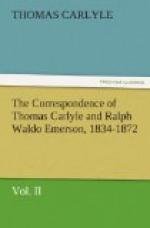“For thou hast
passed all chance of human life,
And not again to thee
shall beauty die.”
It is thirty-three years in July, I believe, since I first saw her, and her conversation and faultless manners gave assurance of a good and happy future. As I have not witnessed any decline, I can hardly believe in any, and still recall vividly the youthful wife, and her blithe account of her letters and homages from Goethe, and the details she gave of her intended visit to Weimar, and its disappointment. Her goodness to me and to my friends was ever perfect, and all Americans have agreed in her praise. Elizabeth Hoar remembers her with entire sympathy and regard.
I could heartily wish to see you for an hour in these lonely days. Your friends, I know, will approach you as tenderly as friends can; and I can believe that labor—all whose precious secrets you know—will prove a consoler,—though it cannot quite avail, for she was the rest that rewarded labor. It is good that you are strong, and built for endurance. Nor will you shun to consult the awful oracles which in these hours of tenderness are sometimes vouchsafed. If to any, to you.
I rejoice that she stayed to enjoy the knowledge of your good day at Edinburgh, which is a leaf we would not spare from your book of life. It was a right manly speech to be so made, and is a voucher of unbroken strength,—and the surroundings, as I learn, were all the happiest,—with no hint of change.
I pray you bear in mind your own counsels. Long years you must still achieve, and, I hope, neither grief nor weariness will let you “join the dim choir of the bards that have been,” until you have written the book I wish and wait for,—the sincerest confessions of your best hours.
My wife prays to be remembered to you with sympathy and affection.
Ever yours faithfully,
R.W.
Emerson
CLXXV. Carlyle to Emerson
Mentone, France, Alpes Maritimes
27 January, 1867
My Dear Emerson,—It is along time since I last wrote to you; and a long distance in space and in fortune,—from the shores of the Solway in summer 1865, to this niche of the Alps and Mediterranean today, after what has befallen me in the interim. A longer interval, I think, and surely by far a sadder, than ever occurred between us before, since we first met in the Scotch moors, some five and thirty years ago. You have written me various Notes, too, and Letters, all good and cheering to me,— almost the only truly human speech I have heard from anybody living;—and still my stony silence could not be broken; not till now, though often looking forward to it, could I resolve on such a thing. You will think me far gone, and much bankrupt in hope and heart;—and indeed I am; as good as without hope and without fear; a gloomily serious, silent, and sad old man;




